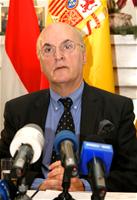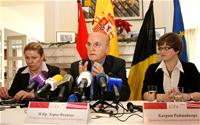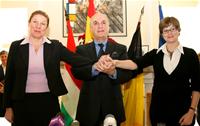The EU, Bulgaria, priorities and realities
Adelina Marini, January 7, 2010
 The Spanish Ambassador in Bulgaria Jorge Fuentes said today something that impressed me a lot during the presentation of the Spanish Presidency's priorities. He said regarding the murder the other day of the controversial Bulgarian former journalist and close to the mafia person Bobi Tsankov that in Bulgaria security has 2 levels: security of the ordinary citizens which is very good and security of those, defined as mafia, which is poor. Thus H.E. Fuentes sees things in Bulgaria from the point of view of a man, living in Bulgaria for several years.
The Spanish Ambassador in Bulgaria Jorge Fuentes said today something that impressed me a lot during the presentation of the Spanish Presidency's priorities. He said regarding the murder the other day of the controversial Bulgarian former journalist and close to the mafia person Bobi Tsankov that in Bulgaria security has 2 levels: security of the ordinary citizens which is very good and security of those, defined as mafia, which is poor. Thus H.E. Fuentes sees things in Bulgaria from the point of view of a man, living in Bulgaria for several years.
I see them quite the opposite way - security of the mafia is excellent and security of ordinary citizens is actually none. The fact that a mafia guy is being killed is not a problem of security. Indeed, it is a proof of excellent security - when someone violates the rules he gets punished. In fact, this was explained quite well by a prominent Bulgarian mafia guy on one of Bulgaria's national TV channels 1 or 2 years ago and I have no reason not to believe him that, actually, the mafia has not just a rule of their laws but something even more - discipline and iron order.
Unfortunately in the state things are very much different. And I understood this again today. On my way back from the residence of the Spanish ambassador I decided to stop buy and have my car washed. Not that I will be fined by the traffic police for having a very dirty car, although they have to fine me, but just that the windows of my car were so dirty and dusty of the perfect cleanness of Sofia that I decided to spend 20 levs (appr. 10 euro) to have my car washed from the inside and the outside. I parked in front of the car-wash that I use for years and went out to ask whether there was a free cell, how much time did I have to wait etc. The moment when a young boy told me to get my car in the cell over there, a brand new Mercedes, model 2009, entered the cell in question without even making an attempt to find out whether it was his turn. The car had German license plates.
2 subjects went out of the car, with whom I'd never play chess. Their behaviour showed that it was ALWAYS their turn, no matter how many people wait in line and for what. I got mad. But I got even madder after the boy with a head downward told me: "Well, they got your turn. The other cell will be free in 20 minutes, please wait in the restaurant nearby". What should I do, I will wait since I was already determined to have my car washed. In the restaurant I started a conversation with the owners of the car-wash and the restaurant as we were all alone. I started to get more and more angry with that conversation. I was informed that those guys with whom I'd never play chess were the drivers of some of the bosses of the group of the "Cats"! Do you remember who they are? Those are businessmen from the Bulgarian town of Pernik, quite near to the capital Sofia who deal with construction and were recently involved in a scandal between the Bulgarian Socialists Party and the ruling party GERB after the socialists claimed that GERB was being financed by the "cats".
"The Cats" have their numerous and pretty expensive cars (among which Bentleys and Porsches) cleaned quite regularly in the same car-wash but today one of the bosses has a name day and that is why his drivers came instead. I was numb from the conversation, from which I understood that another prominent mafia figure, shot dead some years ago, was also a frequent visitor of this quite regular car-wash. There are many car-wash centres in Sofia and I thought that I knew which ones were "luxury" meaning owned by the mafia. And I was surprised that this quite regular car-wash was the favourite of so many mafia men. Maybe it was the quality of the service, I don't know. But, anyway, the tales about those guys are very interesting - about how they thought of themselves as being great, how they closed the whole restaurant while they had lunch out of fear that they might get killed or poisoned. They also used to say the personnel that they were omnipresent because they had 1-2 murders in their biographies but never spent even a day in prison because if you have money in this country then you have no problems at all. And more, and more.
So, I asked myself, how is it possible a man to be shot dead in the middle of the day, in the  centre of Sofia and just couple of hours later there are arrests, suspects, indictments! I really do not understand! The suspects and the victim were all clients of the prosecution, of the court and the police. First of all why, on Earth, were day at large? Secondly, why after so many murder threats, the state did nothing to protect the victim? Thirdly, how did the police know just hours who ordered the murder of Boby Tsankov and months ago the court ruled out that there was not threat for his life?
centre of Sofia and just couple of hours later there are arrests, suspects, indictments! I really do not understand! The suspects and the victim were all clients of the prosecution, of the court and the police. First of all why, on Earth, were day at large? Secondly, why after so many murder threats, the state did nothing to protect the victim? Thirdly, how did the police know just hours who ordered the murder of Boby Tsankov and months ago the court ruled out that there was not threat for his life?
Fourth, how is the government fighting the organised crime since it is not problems for businessmen with controversial businesses to walk freely around the city, to visit the same restaurants and the police not to know? Or not to be able to find good evidence, clues and witnesses? There are also, fifth and sixth but it doesn't matter because those are rhetoric questions.
My car is now washed. On my way out of the restaurant I heard the traditional for the restaurant folklore - "we hope that the EU will put us in order". No, it won't because the EU has different priorities. If for us for years a priority number one had to be the fight with organised crime and corruption (more than 10 years), for the Eu priorities constantly change. Now for our partners in the 27-member Union it is important to find a solution to the problem with unemployment which has already reached 15 mn people. It is also important to find a solution to the problem with illegal immigration, the energy supplies for Europe, human rights, gender equality and how European institutions to start working more effectively. More about the priorities of the Spanish Presidency you can read on euinside here.
 However for Bulgaria it still is not quite clear which are the main priorities. By the way, so as to guarantee a full continuity of the implementation of the European priorities and given the entering into force of the Lisbon Treaty, the presidency of the EU has been cosmetically changed. The rotation of presidencies is kept at every 6 months, but the priorities will be set for a year and a half in advance by the current presidency, which is now Spain and the 2 that follow - Belgium and Hungary. The purpose is to be avoided each country to follow its own specific national interests instead of more important European ones.
However for Bulgaria it still is not quite clear which are the main priorities. By the way, so as to guarantee a full continuity of the implementation of the European priorities and given the entering into force of the Lisbon Treaty, the presidency of the EU has been cosmetically changed. The rotation of presidencies is kept at every 6 months, but the priorities will be set for a year and a half in advance by the current presidency, which is now Spain and the 2 that follow - Belgium and Hungary. The purpose is to be avoided each country to follow its own specific national interests instead of more important European ones.
Here, unfortunately, we have not grown up enough yet to form our priorities together and no matter how hard it might be to try and implement them. So it would not be a bad idea to study the example of Greece which is now suffering financially for its cunning behaviour. Now the Greek admit that they have reached this hardships because of the corruption which is running deep in politics and economy, because of avoiding taxes and because of the lack of a clear vision for development. And the fact that Greece is a EU member state for decades has not changed the sad facts.
Maybe this is the reason why the Spanish ambassador in Bulgaria said today that if everything is OK Bulgaria will be able to join the Schengen area and the eurozone sometime in 2013. He even advised us not to rush, especially regarding the eurozone because the euro might have a lot of advantages but it has a lot of shortcomings as well. One of them is that the introduction of the euro almost always leads to serious jump of prices. And not only this. The introduction of the single currency requires a very tight fiscal and monetary policy for which Bulgaria is definitely not mature enough.